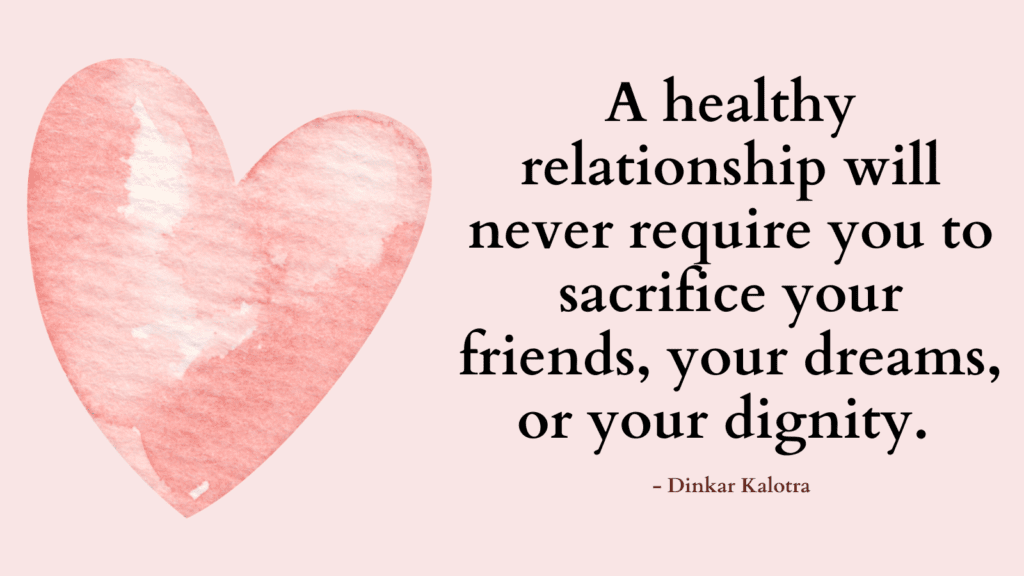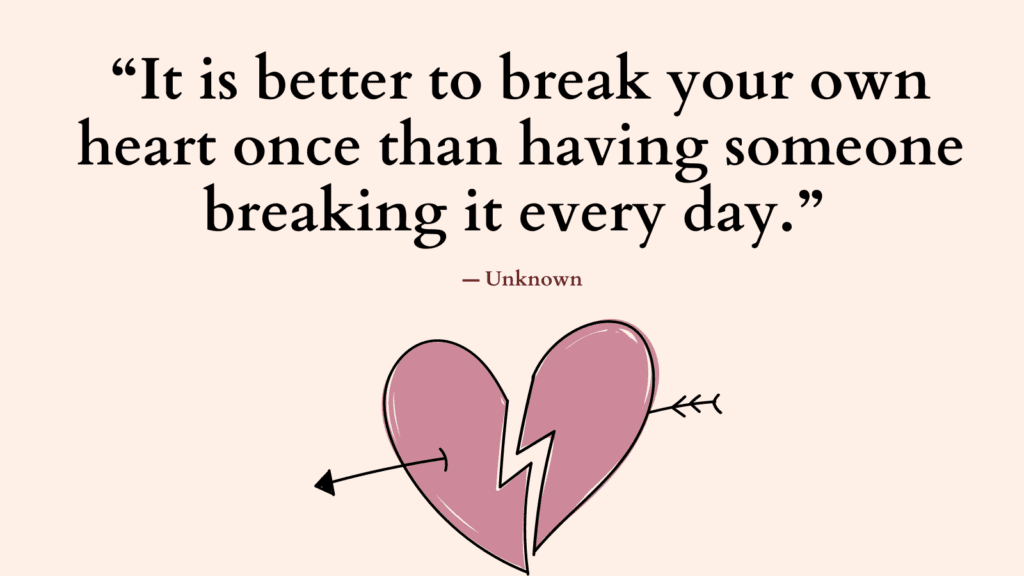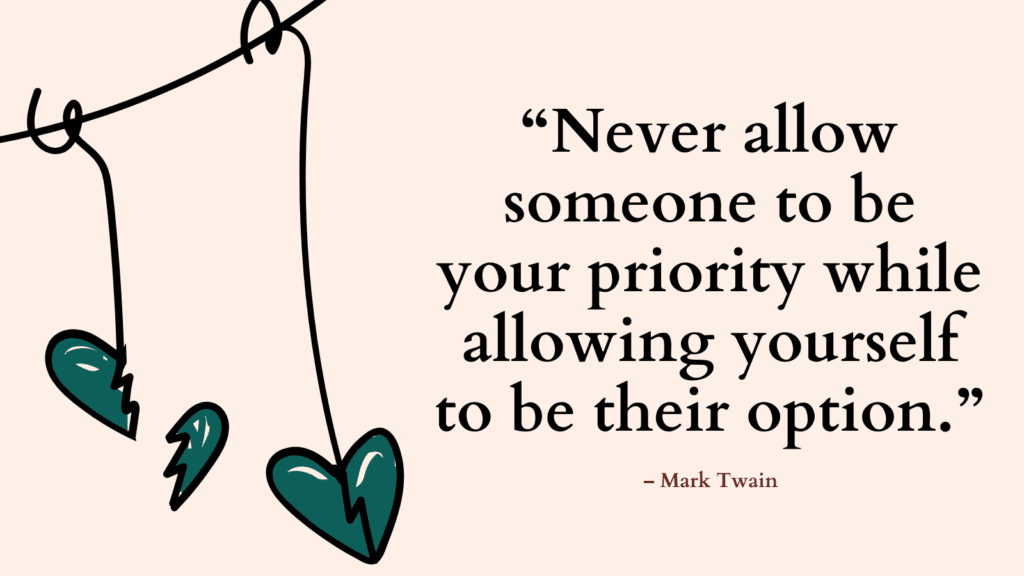Today, you’re going to learn all about betrayal blindness – what it is and how to overcome it.
What Is Betrayal Blindness?
Victims of betrayal often experience betrayal blindness.
Betrayal blindness, a term coined by researcher Dr. Jennifer Freyd, refers to the state of denial some people stay in after being betrayed.
Betrayal blindness is when you don’t allow yourself to see or reflect on what’s going on or fully engage with reality because if you did, what you may discover may threaten your relationship with the person who betrayed you.
For instance, you may catch your partner kissing someone and accept their claims that they don’t know this person.
The human mind is amazingly convoluted. Betrayal blindness requires this convolution, for one to be in the dual state of simultaneously knowing and not knowing something so important.
Although not all betrayal involves blindness, when the betrayal is repeated or ongoing, it is intrinsically linked with some deception that is not fully detected.
What Is Betrayal Trauma?
Betrayal trauma refers the emotional impact a person experiences after having their trust violated by significant people in their life (e.g. a parent, caregiver, or other important relationship from childhood, or romantic partners).
Related: Betrayal Trauma Test: Do I Have Betrayal Trauma?
Forms of Betrayal in Relationships
Relationships rest on agreements (conscious or unconscious).
For instance, couples have some shared understanding of what constitutes infidelity and agree to trust each other not to cheat.
The following is a list of some examples of betrayal:
- Committing an act of emotional or physical infidelity
- Not being there when your partner is hurting or sick
- Not keeping promises
- Keeping secrets
- Lying
- Humiliating or putting down your partner in public or private
- Being physically violent
Related: 7 Stages Of Betrayal Trauma (+7 Tips For Overcoming Betrayal Trauma)
How Betrayal Hits You
Betrayal hits in two ways: (1) by sudden revelation or, (2) by gradual realization.
1. Sudden Revelation
With some forms of betrayal like infidelity or deceit, the feeling of betrayal is felt suddenly and at once.
Although you may have suspected all along, nothing could mitigate the shock struck by incontrovertible evidence (e.g. a confession, an eyewitness account, phone messages, e-mails, etc.).
2. Gradual Realization
With some other forms of betrayal like abuse, the realization of betrayal and what your life has become can be gradual.
You may have been trying to overlook their behavior, make excuses for it, or simply refuse to acknowledge it.
Your efforts to preserve emotional bonds with the other person may have delayed the realization of the betrayal.
This is what we call betrayal blindness.
Related: How To Step Out Of Denial? Top 10 Steps To Overcome Denial When The Truth Is Heartbreaking
Why Is Betrayal Blindness Toxic?
Although betrayal blindness can shield us from feeling the pain of betrayal, over time, it can damage our well-being.
In fact, remaining in a state of blindness to betrayal takes so much energy and time, developing habits of perception, habits of thought, and patterns of behavior to preserve the status quo.
You may have been invalidating or gaslighting yourself into believing that everything is fine.
You may have also been gaslighted and lied to by your betrayer.
The longer you remain in blindness, the higher the price you pay in harm to your well-being.
Related: Am I Being Gaslighted Quiz (& How To Recover From Gaslighting In 10 Steps)
Why Do People Remain Blind To Betrayal?
Whether consciously or unconscious, people remain blind to betrayal for different reasons:
- They may be dependent on the betrayer physically, emotionally, or financially,
- they may not be emotionally resilient enough to deal with the aftermath of acknowledging the betrayal and the trauma it might cause, or
- although the information is in front of their eyes, it simply doesn’t register as evidence of betrayal (they can’t think the person is capable of betrayal, the betrayer comes up with convincing excuses, etc.)
Related: Best 55 Betrayal Trauma Quotes That Will Make You Feel Less Alone
How To Come Out Of Betrayal Blindness?
#1. Get In Touch With Yourself
We are more likely to be blind to betrayal when we are unable to name our own experience or connect with our inner world.
We become less self-trusting and too likely to trust the wrong people.
Evidence of betrayal is often in front of our eyes, but unless we are connected to our emotions, we may feel that something is wrong but not be able to name it.
Related: Self-Abandonment: What Is It & How To Get Back In Touch With Yourself
#2. Take Care Of Yourself
If you suspect or know that you have been betrayed, first of all take care of yourself.
Blindness to betrayal, especially if it has been going on for a long time can damage your well-being.
Remaining in betrayal blindness might also mean being out of touch with yourself and not having developed enough habits that are self-caring and self-nurturing.
If you’re going to face the truth, you’ll need enough emotional resilience to walk you through it.
Related: Top 45 Self Care Day Ideas at Home To Kickstart Your Self Care Ritual
#3. Seek Social Support
Without support from others we feel alone and retreat into silence and isolation.
People we trust can validate our experience and help us come out of denial and blindness.
Social support can also help us feel less ashamed as we open up and allow ourselves to be vulnerable.
Seeking social support isn’t just about asking for help.
Even investing in relationships that are safe and in which you feel good about yourself, can be a great source of emotional support.
FREE Toxic Relationship Worksheets
Recovering From Betrayal trauma
#1. Avoid Acting On Your Feelings
The perceived loss of value or worth is what causes your pain. Betrayal makes you feel less lovable.
To recover you need to feel more valuable and lovable.
However, typical defensive reactions to betrayal can turn you into someone you’re not.
Emotional reactivity can make it hard to be yourself
Allow yourself some time to process what happened before deciding what next step to take.
Instead of acting on your feelings, make a conscious choice to act on your values (Your values are beliefs and personal qualities that are most important to you, regardless of what occurs in your environment).
Related: Best 99 Coping Skills (+FREE Coping Worksheets)
Values – Why Are They Important?
Values are crucial to set goals and live an authentic life.
But values are especially important when we risk behaving uncharacteristically because of our overwhelming feelings.
Feelings vs. Values
| Feelings | Values |
|---|---|
| Are about what you’re experiencing | Are about who you are |
| Influenced by physiological states (hanger, fatigue, illness, etc.) and environment | Far less influenced by physiological states and the environment |
| Automatic and unconscious | Are conscious |
| Fleeting (coming and going within minutes provided you don’t prolong them by magnifying, catastrophizing, etc.) | Are consistent over time |
Get FREE Values Worksheets HERE.
#2. Offer Yourself Compassion
Self-compassion is a sympathetic response to your pain with a motivation to heal.
It tends to bring a sense of hope and empowerment.
Self-criticism, on the other hand, is when you blame yourself for your pain with a measure of punishment for your perceived incompetence or inadequacy.
But self-criticism is unlikely to help you improve and will only crash your self-esteem further. It can turn your pain into suffering.
Related: How To Start A Self Love Journey? Top 10 Powerful Ways to Love Yourself More
#3. Increase Your Emotional Resilience
Betrayal can crash your sense of self-worth and self-esteem.
This can leave you feeling powerless and increase emotional reactivity, including overreacting to life’s minor irritations as well as its major challenges.
Increasing your emotional resilience will help you feel more empowered and build up your sense of personal value.
Helpful ways to increase emotional resilience include:
Optimizing your physical healthy by:
- Exercising regularly
- Eating healthy, balanced diet
- Getting quality sleep
Optimizing your mental health by:
- Using relaxation exercises (e.g. deep breathing, grounding, progressive muscle relaxation, mindfulness meditation, etc.)
- Journaling your thoughts and feelings
- Boosting your mood by doing more pleasurable activities (find a FREE list of pleasurable activities HERE)
- Practicing gratitude
Related: How To Practice Gratitude When Depressed? (10 Practical Gratitude Exercises)
#4. Seek The Help of A Mental Health Professional
Having been in blindness to betrayal, you may have isolated yourself from others and you may find it difficult to ask for help.
However, coming out of blindness and facing the pain of betrayal, especially one that has been going on for so long can be extremely overwhelming.
A mental health professional can help you process what happened and manage your difficult emotions as you grieve and heal.
Psychologist Locator and the National Register are two websites for locating psychologists in USA.
Online therapy is also an option. It can be much affordable than in-person therapy, but can be equally effective. (source)

References
- Portions of this article were adapted from the book Living and Loving After Betrayal, © 2013 by Steven Stosny. All rights reserved.
- Portions of this article were adapted from the book Blind to Betrayal, © 2013 by Jennifer Freyd and Pamela Birrell. All rights reserved.
- Betrayal trauma – Wikipedia
- Betrayal Trauma: Signs, Recovery & Getting Help (choosingtherapy.com)
- Betrayal Trauma: Signs and How to Start Healing (healthline.com)
- Betrayal Trauma – an overview | ScienceDirect Topics
- Definition of Betrayal Trauma Theory (uoregon.edu)
- (PDF) The Impact of Betrayal Trauma on the Tendency to Trust (researchgate.net)
- Betrayal trauma: relationship to physical health, psychological distress, and a written disclosure intervention – PubMed (nih.gov)



